

New Keynesian economics. New Keynesian economics is a school of contemporary macroeconomics that strives to provide microeconomic foundations for Keynesian economics.
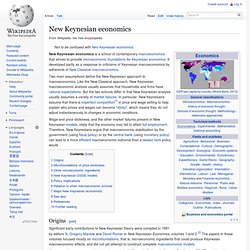
It developed partly as a response to criticisms of Keynesian macroeconomics by adherents of New Classical macroeconomics. Origins[edit] Significant early contributions to New Keynesian theory were compiled in 1991 by editors N. Taylor rule. John B.
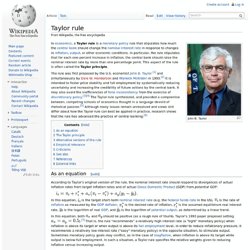
Taylor In economics , a Taylor rule is a monetary-policy rule that stipulates how much the central bank should change the nominal interest rate in response to changes in inflation , output , or other economic conditions. In particular, the rule stipulates that for each one-percent increase in inflation, the central bank should raise the nominal interest rate by more than one percentage point. This aspect of the rule is often called the Taylor principle . The rule was first proposed by the U.S. economist John B. E-archivo.uc3m.es/bitstream/10016/13441/1/financieras_huguet_2012_pp.pdf. Superciclo de los commodities apunta hacia abajo.
Marcel claude, educacion gratuita. Patentes comerciales: La fórmula que permite a grandes firmas pagar menos que un quiosco. Raúl tiene un local de plumeros en plena calle, cerca del Costanera Center, y Marisol vende sopaipillas a pasos de una Farmacia Ahumada en La Florida.
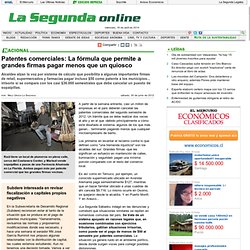
Ambos pagan más por patente comercial que las grandes firmas vecinas. Subdere interesada en revisar fiscalización a capitales propios negativos En la Subsecretaría de Desarrollo Regional (Subdere) reconocen estar al tanto de la situación que se produce en el pago de patentes municipales: "Generalmente, revisamos las normas y proponemos modificaciones donde sea necesario, y hace una semana el senador RN José García Ruminot nos propuso algunas relacionadas con la distribución de capital, las cuales estamos estudiando. Aun no tenemos una decisión tomada. Vamos a ver si hay medidas correctivas que efectuar", dice el jefe del área municipal de esa repartición, Mauricio Cisternas.
Aclara, eso sí, que "básicamente, son perfeccionamientos. Bienvenidos a Parisinet. Student Loan Debt Suicides. Johanssen writes: "Suicide is the dark side of the student lending crisis and, despite all the media attention to the issue of student loans, it's been severely under-reported.
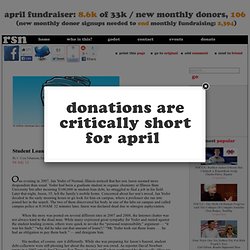
" By C. Cryn Johanssen, Economic Hardship Reporting Project 04 July 12. Dark Ages Redux: American Politics and the End of the Enlightenment. Antonino Parisi: La reforma tributaria, es sòlo un canapè y recaudarà pràcticamente nada. Bienvenidos a Parisinet.
Cuadernos de economía - UN MODELO DE SWITCHING PARA EL CRECIMIENTO EN CHILE. ** División de Estudios, Banco Central de Chile, Agustinas 1180, SantiagoCHILE.
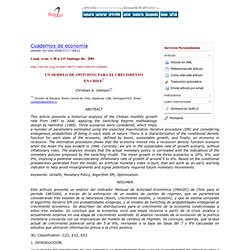
Email: cjohnson@bcentral.cl This article presents a historical analysis of the Chilean monthly growth rate from 1987 to 2000, applying the Switching Regime methodology design by Hamilton (1989). Three scenarios were considered, which imply a number of parameters estimated using the expected maximization iterative procedure (EM) and considering endogenous probabilities of being in each state of nature. There is a characterization of the conditional density function for each state of the economy, defined by boom, sustainable growth, and finally, an economy in recession. The estimation procedure shows that the economy moved into a recession density function scenario when the Asian Flu was evident in 1998. Keywords: Growth, Monetary Policy, Algorithm EM, Optimization. Www.dii.uchile.cl/~ris/RISXIX/RISXIXpaper1.pdf. Acero laminado en caliente - Precio Mensual - Precios de Mercancías. Superintendencia de Bancos e Instituciones Financieras - Chile.
SBIF - Cliente Bancario - Portada. Banned TED Talk. Nick Hanauer ECONOMY AS ECOSYSTEM Interview! Do Job 'Creators' Think They Are Like God? Young Billionaire Says Wealthy Are Not "Job Creators" Millionaire Nick Hanauer and Fox News Neil Cavuto. Nick Hanauer. Franco Parisi: La verdad del sueldo mínimo en chile. Next Generation of Individual Account Pension Reforms in Latin America. Latin America led the world in introducing individual retirement accounts intended to complement or replace defined benefit state-sponsored, pay-as-you-go systems.
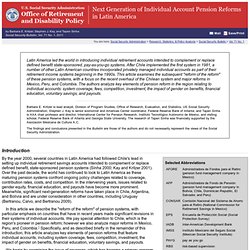
After Chile implemented the first system in 1981, a number of other Latin American countries incorporated privately managed individual accounts as part of their retirement income systems beginning in the 1990s.
The mathematical equation that caused the banks to crash. It was the holy grail of investors.

The Black-Scholes equation, brainchild of economists Fischer Black and Myron Scholes, provided a rational way to price a financial contract when it still had time to run. It was like buying or selling a bet on a horse, halfway through the race. It opened up a new world of ever more complex investments, blossoming into a gigantic global industry. But when the sub-prime mortgage market turned sour, the darling of the financial markets became the Black Hole equation, sucking money out of the universe in an unending stream. Okun's law. Graph of US quarterly data (not annualized) from 1947 through 2002 estimates a form of the difference version of Okun's law: %Change GNP = .856 - 1.827*(Change Unemployment Rate). R^2 of .504. Differences from other results are partly due to the use of quarterly data. Ley de Okun. La llamada ley de Okun, es una observación empírica que señala la correlación existente entre los cambios en la tasa de desempleo y el crecimiento de una economía.
Fue propuesta en 1962 por el economista norteamericano Arthur Okun en el artículo "Potential GNP: Its Measurement and Significance".[1] Okun señaló que para mantener los niveles de empleo, una economía necesitaba crecer cada año entre el 2,6% y el 3%. Cualquier crecimiento inferior significaba un incremento del desempleo debido a la mejora de la productividad. La ley de Okun señala además, que una vez mantenido el nivel de empleo gracias al crecimiento del 3%, para conseguir disminuir el desempleo es necesario crecer dos puntos porcentuales por cada punto de desempleo que se quiera reducir.[2] Esta "ley", es solo una observación empírica, ya que no es posible demostrarla. Race Against The Machine. The economics of abundance: a political economy of freedom, equity, and ... - Wolfgang Hoeschele. Quien parte y reparte: el debate sobre la reducción del tiempo de trabajo - Jorge Riechmann, Albert Recio.
Pdf/1011.3707v2.pdf. Secret World Bank Report Blames Biofuels for Food Price Spike. Biofuel demand is the villain behind a catastrophic spike in global food prices, says a leaked World Bank report that was hidden for fear of embarrassing President Bush.
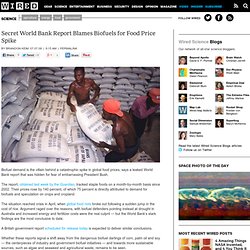
The report, obtained last week by the Guardian, tracked staple foods on a month-by-month basis since 2002. Their prices rose by 140 percent, of which 75 percent is directly attributed to demand for biofuels and speculation on crops and cropland. The situation reached crisis in April, when global food riots broke out following a sudden jump in the cost of rice. Food Prices Could Hit Tipping Point for Global Unrest. When food shortages and rising prices drive people to desperation, social unrest soon follows.
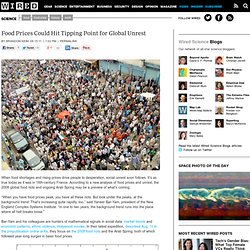
It’s as true today as it was in 18th-century France. According to a new analysis of food prices and unrest, the 2008 global food riots and ongoing Arab Spring may be a preview of what’s coming. “When you have food prices peak, you have all these riots. But look under the peaks, at the background trend. That’s increasing quite rapidly, too,” said Yaneer Bar-Yam, president of the New England Complex Systems Institute.
Nanosecond Trading Could Make Markets Go Haywire. The afternoon of May 6, 2010 was among the strangest in economic history.
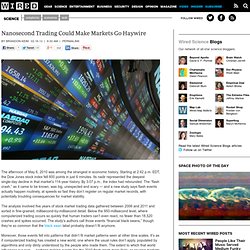
Starting at 2:42 p.m.